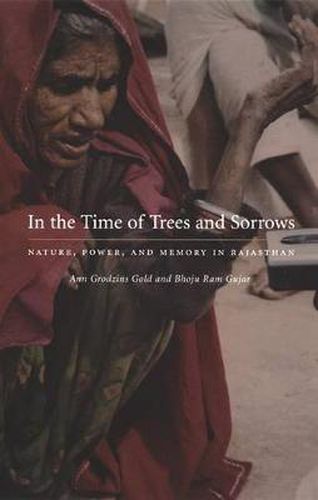Readings Newsletter
Become a Readings Member to make your shopping experience even easier.
Sign in or sign up for free!
You’re not far away from qualifying for FREE standard shipping within Australia
You’ve qualified for FREE standard shipping within Australia
The cart is loading…






In the Time of Trees and Sorrows showcases peasants’ memories of everyday life in North India under royal rule before Indian Independence and their musings on the contrast between the old days and the unprecedented shifts that a half century has wrought. It is an oral history of the former Kingdom of Sawar in the modern state of Rajasthan, India, as it was from the 1930s to the 1950s. Based on testimonies from the early 1990s, the book stands as a polyvocal account of the radical political and environmental changes the region and its people have faced in the twentieth century. Not just the story of modernity from the perspective of a rural village, these interviews and author commentaries narrate a relatively sudden transformation for this small community from subjection to a local despot and to a remote colonial power to citizenship in a modern postcolonial democracy. Unlike other recent studies of Rajasthan, whose former princes continue to fascinate particularly the Western imagination, the current study gives voice exclusively to former subjects who endured the double oppression of colonial and regional rulers.Gold and Gujar thus place subjective subaltern experiences of daily rural routines, manifestations of power relations, and sweeping changes to the environment (after the fall of kings) that turned lush forests into a barren landscape on equal footing with historical fact and archival sources. Nature as idea and concept, culturally laden as it is in Western thought, plays a central role in this ethnographic text. Ambiguous and complex, nature reflects the variegated responses Sawar informants had to their surroundings and to their beggar past (forced labour under the local king). The framing questions of this South Asian history are: what was it like in the time of kings? and what happened to the trees? Specialists of South Asian history, anthropology, subaltern studies, and the environment will welcome publication of this book.
$9.00 standard shipping within Australia
FREE standard shipping within Australia for orders over $100.00
Express & International shipping calculated at checkout
In the Time of Trees and Sorrows showcases peasants’ memories of everyday life in North India under royal rule before Indian Independence and their musings on the contrast between the old days and the unprecedented shifts that a half century has wrought. It is an oral history of the former Kingdom of Sawar in the modern state of Rajasthan, India, as it was from the 1930s to the 1950s. Based on testimonies from the early 1990s, the book stands as a polyvocal account of the radical political and environmental changes the region and its people have faced in the twentieth century. Not just the story of modernity from the perspective of a rural village, these interviews and author commentaries narrate a relatively sudden transformation for this small community from subjection to a local despot and to a remote colonial power to citizenship in a modern postcolonial democracy. Unlike other recent studies of Rajasthan, whose former princes continue to fascinate particularly the Western imagination, the current study gives voice exclusively to former subjects who endured the double oppression of colonial and regional rulers.Gold and Gujar thus place subjective subaltern experiences of daily rural routines, manifestations of power relations, and sweeping changes to the environment (after the fall of kings) that turned lush forests into a barren landscape on equal footing with historical fact and archival sources. Nature as idea and concept, culturally laden as it is in Western thought, plays a central role in this ethnographic text. Ambiguous and complex, nature reflects the variegated responses Sawar informants had to their surroundings and to their beggar past (forced labour under the local king). The framing questions of this South Asian history are: what was it like in the time of kings? and what happened to the trees? Specialists of South Asian history, anthropology, subaltern studies, and the environment will welcome publication of this book.